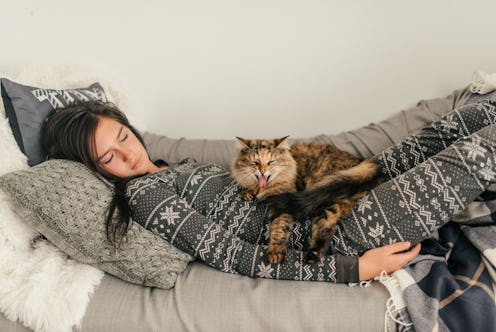Life
If You Wake Up Exhausted Every. Single. Day. This Might Be The Reason Why

I'm sure you know the drill, but if you're anything like me, you wake up tired. You get to work tired. A coffee helps, but there's the post-lunch slump, the 5 p.m. exhaustion and yes, you've guessed it, I'm tired again by the time I get home and go to bed. We work hard, we play hard, and we're seriously lacking in sleep. But is being tired part of everyday life, and should we be accepting it? Is it just a lack of sleep, or could it be linked to something more serious? I decided to call in the big guns, and ask the experts why am I always tired.
As obvious as it sounds, it still bears repeating: it may simply be that you're not getting enough sleep. Brits in general are not, according to a study by Aviva Health. The results found that more than 38 percent of British adults feel they don't get enough hours sleep, with the UK the worst affected among the 14 countries that participated. The optimal amount of sleep varies from person to person but is roughly seven to nine hours, according to the Sleep Foundation. If you're not sleeping for long enough, it's no wonder you're tired, but getting into bed early can be really difficult, given later working hours, household chores, and maintaining a social and family life. The organisation recommends to try eating dinner earlier if you can, and keeping phones and laptops in another room so you're not tempted to watch videos and text.
Another possible reason for your tiredness is you're sleeping for long enough, but it's poor quality sleep. Dr. Davinder Garcha tells me that psychological tiredness can be an issue, caused by stress and anxiety, often about work or financial concerns. "This may not necessarily mean a lack of sleep, but rather it may be associated with a lack of good quality sleep. Sleep is made up of various processes and stages, and it is thought that good quality sleep involves spending sufficient time in each of these stages, including deep sleep. Anxiety and stress can impact sleep patterns, and are known to significantly lower levels of deep sleep achieved," he says. Making lists of your concerns can help, so that you're not going over them in your head all night, and seeking anxiety treatment could also be an option.
Diet and lifestyle could also play a part in poor quality sleep, Dr. Garcha says.
"Excessive alcohol consumption in the evening, or eating sugary foods, are often associated with poor sleep and pulling a person out of deep sleep more readily. This means you feel more lethargic the following day. A 2016 study from Columbia University found that high sugar and saturated fat, and low fibre, were associated with lighter, less restorative sleep, compared to diets lower in sugar and saturated fats, and higher in fibre. Altering your diet to include more fibre, whilst reducing sugar, alcohol and saturated fat should help banish the tiredness."
If you're sleeping enough and you believe it's good quality, then it may be time to look at other reasons why you're tired. One could be a gut health issue. "The friendly bacteria within our gut, known as our gut microflora, are vitally important to our wellbeing, including our sleep. In fact, they produce hormones and chemical neurotransmitters that help calm and relax us. So when our microflora is damaged (for example by antibiotic use), this can have knock-on effects on our sleep. One easy way to restore the gut microflora to health is to use a probiotic, such as Bio-Kult Advanced 14-strain," Dr. Garcha adds.
A fairly common reason for tiredness is iron-deficiency anaemia, affecting one in 10 women in the UK. It can leave you totally lacking in energy, but is easily diagnosed with a blood test, and easily resolved by supplementing with iron tablets, and eating more iron-rich foods such as "green, leafy vegetables such as kale, as well as meat and beans," recommends Dr. Garcha.
You should expect to be more tired when work and life get busy, but try not to worry about it. Remember to relax, nutritionist Sarah Flower says.
"It is incredibly important to find the time to wind down from and relax prior to heading to bed. We need time to relax, shake off the stress of the day and switch off both physically and mentally. Where possible, try to follow a structured bed time routine, regardless of the time."
Flower added: "Research has shown that exposure to light during sleep can suppress the immune system, as well as disrupt natural sleep patterns. To help avoid this in the home, invest in black out blinds or curtains, or a sleep mask, to create a dark room to switch off in."
Remember, a degree of tiredness may be normal, but if symptoms do persist and are affecting functionality, book an appointment with your GP, as there may be an easy solution that could massively improve your quality of life.